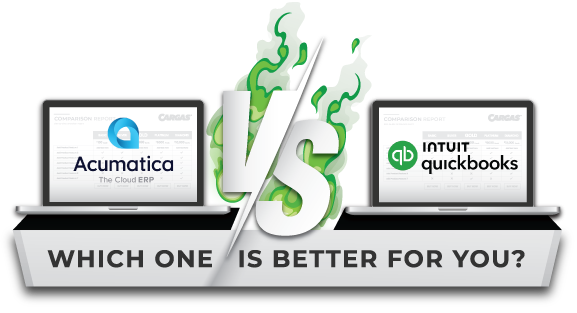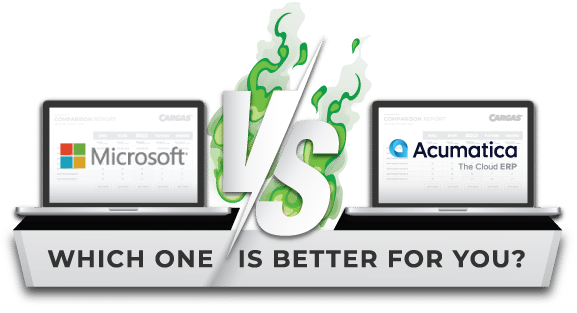COMPARISON | 5 MIN READ
Acumatica vs. QuickBooks
Compare a mid-market ERP with a small business accounting solution.

Acumatica and QuickBooks are both popular ERP solutions with overlapping features and functions. However, the two solutions are designed with different business types in mind. Read on to discover whether Acumatica or QuickBooks Enterprise is a better fit for your business.
Cloud ERP vs SMB Accounting Software
Features
Acumatica Core Features:
- General Ledger
- Accounts Payable
- Accounts Receivable
- Cash Management
- Tax Management
- Customer Management
- Payments
- Reporting & Dashboards
Acumatica Advanced Modules:
- Manufacturing Edition
- Distribution Edition
- Retail Edition
- Construction Edition
- Professional Services Edition
- Global Financials
- Fixed Assets
- Payroll
- Intercompany Accounting
- Deferred Revenue
- Contracts
- Fixed Assets
- Cash Basis Reporting
- Expense Management
- AP Document Recognition
- Sales Force and Marketing Automation
- Case Management
- Portals
- Inventory Control
- Order Management
- Shipping Carrier Integration
- Warehouse Management
QuickBooks Enterprise Core Features:
- General Ledger
- Accounts Payable
- Accounts Receivable
- Inventory Management
- Pricing
- Reporting
- Hosting
- Field Service Management
- Order Management
- Job Costing
QuickBooks Enterprise Additional Modules:
- Built-in Reports
- Advanced Reporting
- Salesforce CRM Connector
- Warehouse Management
- Order Management
- Barcode Scanning
- Cost Tracking
- Pricing Features
- Optimal Pricing
Pricing
Cost is a crucial differentiator between Acumatica and QuickBooks. Smaller businesses are attracted to QuickBooks’ lower price point, but Acumatica’s unique pricing structure is suitable for organizations of all sizes.
QuickBooks Enterprise’s traditional pricing model charges a monthly fee based on functionality and user requirements. Gold, Platinum, and Diamond tier subscriptions are available; Gold and Platinum include 1–10 or up to 30 users, and Diamond includes 1–10 or up to 40 users. More robust accounting features are available at the Platinum and Diamond tiers, but the Gold tier includes all the accounting basics that a small team could need.
Rather than charging a per-user fee, which most traditional accounting and ERP solutions do, Acumatica’s cost is based on transaction volume. Businesses with more monthly transactions will pay a higher subscription cost than those with fewer transactions, but this comes at the unique advantage of more flexible user licensing.
See Acumatica and QuickBooks pricing go head-to-head in our comparison report.
The length of a software implementation varies between organizations based on several factors, such as which software is being implemented, how much training is required, and the complexity of syncing the new software with existing systems.
Since QuickBooks is a straightforward solution for small businesses, its implementation timeline is shorter than most other accounting and ERP solutions. QuickBooks Enterprise can be implemented in 1.5 to 2 months, and this quick launch window is especially enticing for organizations that don’t already have dedicated accounting software.
Because Acumatica is a broader solution than QuickBooks Enterprise, it requires more time to implement. The average Acumatica implementation can take at least 2 to 3 months, with longer implementation cycles for organizations investing in Acumatica’s advanced modules.
Keep in mind that your chosen implementation partner will influence the length of the implementation. Communicative, experienced implementation partners will ensure the process is smooth and your team is equipped to handle the learning curve of new software.
Sum It Up
QuickBooks Enterprise is a basic accounting solution for small organizations with limited budgets. Its price, features, and implementation requirements are user-friendly and accessible, but businesses investing in QuickBooks run the risk of outgrowing it.
Acumatica is an ERP solution with accounting and operational features. Its unique pricing structure and variety of business editions make it a great fit for organizations of all kinds. While it may be too broad and pricey for small businesses, it’s designed to grow alongside mid-sized businesses and can even fulfill the needs of enterprise-level organizations.
At Cargas, our expert consulting team specializes in ERP and financial management solutions, including Acumatica. If you’re struggling to determine which of these solutions is the best fit for your business, we’d love to help. Fill out the form below to unlock our comparison report and take the next step in your software journey.
Acumatica vs. QuickBooks Comparison Report

Take advantage of our side-by-side comparison report by entering your information: ►

Let’s Chat
Still have questions? Get in touch with our expert team of software professionals.


